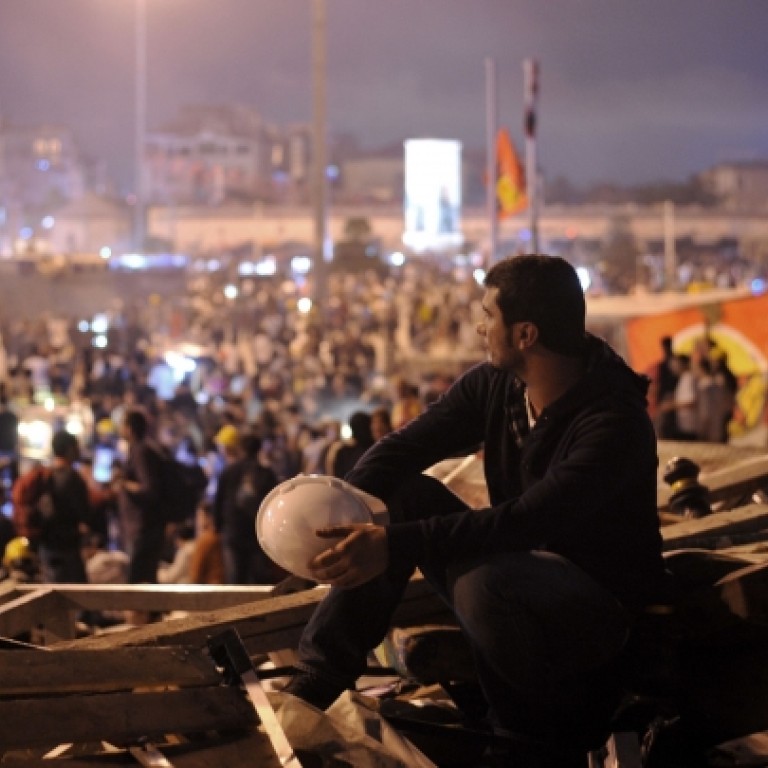
Turkish PM Erdogan holds emergency talks with protest leaders
Gezi demonstrators reject Erdogan's "last warning" to evacuate park
Turkish protest leaders held emergency talks with Prime Minister Recep Tayyip Erdogan overnight after demonstrators rejected his “last warning” to evacuate an Istanbul park at the centre of mass anti-government demos.
With tensions mounting, Taksim Solidarity representatives travelled to the capital Ankara for late-night talks with Erdogan, their first since the unrest began. Local television showed around a dozen members entering the premier’s residence.
Earlier, Erdogan had taken a combative stance against the protesters at Gezi Park who have put up the biggest challenge yet to the decade-long rule of his Justice and Development Party (AKP).
“I’m making my last warning: mothers, fathers please withdraw your kids from there,” he said in a live television broadcast. “Gezi Park does not belong to occupying forces. It belongs to everybody.”
Even as the talks got underway, police fired tear gas at around 200 protesters gathered in Ankara city centre, not far from Erdogan’s offices, witnesses told AFP.
They used water cannon to break up the gathering and arrested five demonstrators.
After the talks, which lasted several hours, AKP spokesman Huseyin Celik insisted the government would do nothing to the park until a referendum they had promised on its future had taken place.
“We want to know what the population of Istanbul thinks, its decision is very important for us,” he added.
The authorities were also waiting for the courts to rule on a move by objectors to block their development plan, Celik added.
In Istanbul, thousands of protesters spent another night under the stars in the park, having earlier rebuffed Erdogan’s call to leave in return for a referendum on the park’s planned redevelopment.
The fight to save the park’s 600 trees prompted a brutal police crackdown two weeks ago, provoking nationwide protests against Erdogan and his Islamic-rooted government, which critics see as increasingly authoritarian.
We don’t trust the government. We will stay in the park. It’s not just about the trees
Four people have died in the nationwide unrest so far and some 5,000 demonstrators, most of whom are young and middle-class, have been injured.
The proposed vote on government plans to build a replica of Ottoman-era military barracks in Gezi Park, suggested by Erdogan on Wednesday, was his first concession to the protesters.
The proposal came out of talks with some protest leaders, a loose coalition representing a variety of interest groups. Many protesters however objected that Taksim Solidarity had been excluded, hardening campers’ resolve to stay in the park.
“We did not suffer through the attacks... so that a referendum could take place,” the Taksim Solidarity group said.
In some of the biggest clashes in the conflict yet, riot police on Tuesday stormed Taksim Square, which borders Gezi Park and has been the focal point of the protest movement.
Police fired tear gas and water cannon at tens of thousands of demonstrators, some of whom hurled back fireworks and petrol bombs.
Other cities across Turkey have seen similar battles.
The United States and other Western allies have criticised Erdogan’s handling of the crisis and the police crackdown has undermined Turkey’s international standing.
The European Parliament on Thursday passed a resolution warning the government against taking “harsh measures against the peaceful protesters”.
But Erdogan rejected the move. “I do not recognise any decision made by the EU Parliament,” he said. “Who do you think you are?”
NATO member Turkey has long sought to join the 27-member EU, but efforts have stalled in recent years, in particular over the country’s human rights record.
As night fell in Istanbul, riot police looked on as hundreds of protesters gathered around a piano in Taksim Square for a live concert, occasionally chanting: “Everywhere is Taksim, everywhere is resistance!”
Inside Gezi Park, protesters were on edge, wary about possible police intervention.
“We don’t trust the government.... We will stay in the park. It’s not just about the trees,” said interior designer Uzay, 25.
Istanbul governor Huseyin Avni Mutlu has said any police operation would only be aimed at troublemakers.
He took to Twitter to reassure the campers there would be no intervention without advance warning, even giving out his personal phone number. His mobile phone number was retweeted 7,500 times within two hours.
While opposition to Erdogan is intense, the 59-year-old has been in power since 2002 and nonetheless remains the country’s most popular politician.
His AKP has won three elections in a row and took nearly half the vote in 2011, having presided over strong economic growth in the predominantly Muslim country of 76 million people.
Erdogan has urged loyalists to respond to the demonstrators by voting for the AKP in local polls next year.
Opponents accuse Erdogan of repressing critics - including journalists, minority Kurds and the military - and of pushing conservative Islamic values on the constitutionally secular nation.
